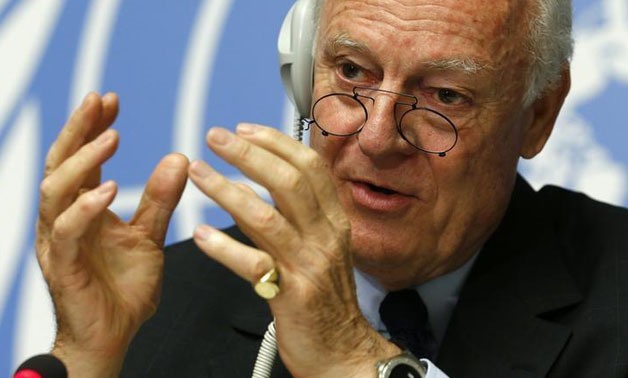
United Nations Special Envoy for Syria, Staffan de Mistura gestures during a news conference at the United Nations European headquarters in Geneva, Switzerland, May 5, 2015. REUTERS/Denis Balibouse
CAIRO - 24 July 2018: Upon the United Nations resolution no. 2254, a committee is being formed to draft a new constitution for Syria. For its part, the Syrian opposition compiled a list comprising 50 members to take part in the committee.
The list included five members from the Cairo Conference for Syrian Opposition. Those are actor Gamal Soliman, Firas al-Khaldy, Kasem Darwish, Ahmed al-Ahmar, and Amar al-Nahas.
On the other hand, the Syrian regime has drawn up a list of 50 members the majority of which is affiliated with the ruling party, al-Baath, and the Syrian People Conference.
Special Envoy of the Secretary-General for Syria Staffan de Mistura visited several Arab countries to consult over the articles of the prospective constitution, and the parties that will participate in the drafting process.
A source told Egypt Today that Egypt - which was visited by de Mistura last month - and Saudi Arabia reject any foreign dictations or interventions in the drafting process, asserting that the decision making process should be exclusive to Syrian parties.
The abovementioned UN resolution was endorsed by the Security Council after a road map was put forward by the Syrian parties that participated in the first Geneva talks in 2015. The map stipulated the necessity of drafting a new constitution, and holding free and fair elections.
Earlier, an Egypt-mediated ceasefire agreement was reached between a number of armed opposition factions in the Syrian coast, with a Russian guarantee and the brokerage of Syria’s Al-Ghad (Tomorrow) opposition movement chairperson, Ahmed Jarba, according to several media reports.
The agreement stipulates participating in efforts to fight terrorism and reach a political settlement to the Syrian crisis, and instructs the return of the refugees and the displaced to their homes and the release of detainees. The agreement stipulates joining efforts to combat terrorism in Syria and establish peace-keeping forces in the region.
Syrian reconciliation
Egypt and Russia have brokered two ceasefire agreements between Syrian President Bashar al-Assad’s forces and armed opposition fighters in certain areas in Northern Syria.
On July 23, 2017, the first ceasefire was announced in the Ghouta region in Damascus. The agreement signed with Egyptian mediation, according to the statement, came after three days of negations in the presence of representatives of the Syrian opposition, Syrian regime and the Russian Defense Ministry.
The agreement's conditions included, “a complete ceasefire binding to all parties, the entry ban of all military troops into Eastern Ghouta, and building Russian observation sites inside Ghouta to monitor the parties’ commitment to the agreement.”
The second de-escalation deal was announced in an area in Northern Homs on August 3, 2017.
Thousands of displaced Syrians headed home after rebels and the government reached a ceasefire deal in the south following more than two weeks of deadly bombardment.
Under the agreement announced after talks between rebels and regime ally Moscow, opposition fighters will hand over a territory in the southern province of Daraa near the Jordanian border.
Daraa is seen as the cradle of the uprising that sparked Syria's seven-year war, and the government retaking full control of it would be a symbolic victory for President Assad.
A Russia-backed regime offensive in Daraa has displaced more than 320,000 people since June 19, the United Nations says, including tens of thousands who fled south to the sealed border with Jordan.
Calm reigned over the region on Saturday as the two sides finalized the ceasefire deal, according to the Syrian Observatory for Human Rights, a Britain-based monitoring group.
The Syrian political situation has been deteriorating since the protests that emerged with the Arab Spring revolutions in 2011, when the opposition created the “Free Syrian Army” to face Assad’s forces. The situation worsened when the Islamic State (IS) terrorist group began interfering in the country in 2014.
More than 350,000 people have been killed and millions displaced since Syria's war started in 2011 with a brutal crackdown on anti-government protests.


Comments
Leave a Comment